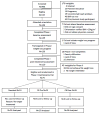A randomized controlled trial testing an Internet delivered cost-benefit approach to weight loss maintenance
- PMID: 27095323
- PMCID: PMC5067166
- DOI: 10.1016/j.ypmed.2016.04.013
A randomized controlled trial testing an Internet delivered cost-benefit approach to weight loss maintenance
Abstract
Weight loss maintenance is a significant challenge in obesity treatment. During maintenance the "costs" of adhering to weight management behaviors may outweigh the "benefits." This study examined the efficacy of a novel approach to weight loss maintenance based on modifying the cost-benefit ratio. Individuals who achieved a 5% weight loss (N=75) were randomized to one of three, 10-month maintenance interventions. All interventions were delivered primarily via the Internet. The Standard arm received traditional weight maintenance strategies. To increase benefits, or rewards, for maintenance behaviors, the two cost-benefit intervention conditions received weekly monetary rewards for self-monitoring and social reinforcement via e-coaching. To decrease behavioral costs (boredom) and increase novelty, participants in the cost-benefit conditions also monitored different evidence-based behaviors every two weeks (e.g., Weeks 1 & 2: steps; Week 3 & 4: red foods). The primary difference between the cost-benefit interventions was type of e-coach providing social reinforcement: Professional (CB Pro) or Peer (CB Peer). Study procedures took place in Providence, RI from 2013 to 2014. Retention was 99%. There were significant group differences in weight regain (p=.01). The Standard arm gained 3.5±5.7kg. In contrast, participants in CB Pro and CB Peer lost an additional 1.8±7.0kg and 0.5±6.4kg, respectively. These results suggest that an Internet delivered cost-benefit approach to weight loss maintenance may be effective for long-term weight control. In addition, using peer coaches to provide reinforcement may be a particularly economic alternative to professionals. These data are promising and provide support for a larger, longer trial.
Keywords: Cost–benefit; E-coaching; Incentives; Internet; Peers; Professionals; Variety; Weight loss maintenance.
Copyright © 2016 Elsevier Inc. All rights reserved.
Conflict of interest statement
statement. Dr. Leahey is currently Chief Scientist and a paid consultant at WayBetter, Inc.; however, the work presented herein is not at all related to her relationship with WayBetter. All remaining authors declare that there are no conflicts of interest to report.
Figures
Similar articles
-
A randomized controlled pilot study testing three types of health coaches for obesity treatment: Professional, peer, and mentor.Obesity (Silver Spring). 2013 May;21(5):928-34. doi: 10.1002/oby.20271. Obesity (Silver Spring). 2013. PMID: 23784896 Free PMC article. Clinical Trial.
-
The design and conduct of Keep It Off: An online randomized trial of financial incentives for weight-loss maintenance.Clin Trials. 2017 Feb;14(1):29-36. doi: 10.1177/1740774516669679. Epub 2016 Sep 23. Clin Trials. 2017. PMID: 27646508 Free PMC article. Clinical Trial.
-
Economic evaluation of an Internet-based weight management program.Am J Manag Care. 2010 Apr 1;16(4):e98-104. Am J Manag Care. 2010. PMID: 20370312 Clinical Trial.
-
A review of weight loss programs delivered via the Internet.J Cardiovasc Nurs. 2006 Jul-Aug;21(4):251-8; quiz 259-60. doi: 10.1097/00005082-200607000-00003. J Cardiovasc Nurs. 2006. PMID: 16823276 Review.
-
A review of web-based weight loss interventions in adults.Obes Rev. 2011 May;12(5):e236-43. doi: 10.1111/j.1467-789X.2010.00787.x. Epub 2010 Aug 26. Obes Rev. 2011. PMID: 20804523 Free PMC article. Review.
Cited by
-
Web-based intervention to promote weight-loss maintenance using an activity monitor: A randomized controlled trial.Prev Med Rep. 2019 Mar 4;14:100839. doi: 10.1016/j.pmedr.2019.100839. eCollection 2019 Jun. Prev Med Rep. 2019. PMID: 30906687 Free PMC article.
-
Persuasive System Design Principles and Behavior Change Techniques to Stimulate Motivation and Adherence in Electronic Health Interventions to Support Weight Loss Maintenance: Scoping Review.J Med Internet Res. 2019 Jun 21;21(6):e14265. doi: 10.2196/14265. J Med Internet Res. 2019. PMID: 31228174 Free PMC article.
-
A randomized feasibility pilot trial of a financial incentives intervention for dietary self-monitoring and weight loss in adults with obesity.Transl Behav Med. 2021 Apr 26;11(4):954-969. doi: 10.1093/tbm/ibaa102. Transl Behav Med. 2021. PMID: 33245118 Free PMC article. Clinical Trial.
-
Optimizing a mobile just-in-time adaptive intervention (JITAI) for weight loss in young adults: Rationale and design of the AGILE factorial randomized trial.Contemp Clin Trials. 2025 Mar;150:107808. doi: 10.1016/j.cct.2025.107808. Epub 2025 Jan 15. Contemp Clin Trials. 2025. PMID: 39824380
-
Patient-Delivered Continuous Care for Weight Loss Maintenance: A Randomized Clinical Trial.JAMA Intern Med. 2025 Jul 1;185(7):767-776. doi: 10.1001/jamainternmed.2025.1345. JAMA Intern Med. 2025. PMID: 40423949 Clinical Trial.
References
Publication types
MeSH terms
Grants and funding
LinkOut - more resources
Full Text Sources
Other Literature Sources
Medical



